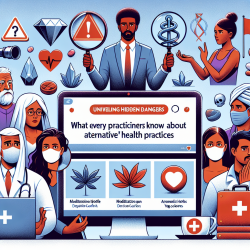The COVID-19 pandemic has catalyzed a massive shift towards virtual primary care, especially impacting adults with intellectual and developmental disabilities (IDDs). This demographic often faces unique challenges in accessing healthcare services due to their complex needs. A recent study titled "Accessibility of Virtual Primary Care for Adults With Intellectual and Developmental Disabilities During the COVID-19 Pandemic: Qualitative Study" sheds light on the benefits and challenges of virtual care for this population.
Key Findings from the Study
The study identified several themes related to the accessibility of virtual care:
- Benefits: Virtual care reduces travel time, minimizes anxiety associated with in-person visits, allows distant caregivers to participate, and decreases illness transmission risks.
- Challenges: Issues include lack of technology access, discomfort with technology use, difficulties in nonverbal communication, patient exclusion from healthcare encounters, and privacy concerns.
An overarching theme was that "one size does not fit all," indicating that the effectiveness of virtual care depends on various factors such as patient characteristics, caregiver capabilities, and the specific context of each healthcare visit.
Practical Steps for Practitioners
To enhance virtual care delivery for adults with IDDs, practitioners can implement several strategies:
1. Improve Technology Access
Ensure that patients and caregivers have access to necessary technology. This might involve providing devices or facilitating access to high-speed internet. Consider partnerships with organizations that can assist in technology provision.
2. Enhance Training and Support
Provide training for both healthcare providers and caregivers on effectively using virtual platforms. This includes understanding how to facilitate communication with patients who rely on nonverbal cues or assistive communication devices.
3. Customize Care Delivery
A flexible approach is crucial. Offer a mix of in-person, video, and phone consultations based on individual patient needs and preferences. Consider hybrid models where initial assessments are done virtually followed by necessary in-person visits.
4. Ensure Privacy and Security
Address privacy concerns by ensuring secure platforms are used for virtual consultations. Educate patients and caregivers about online safety to prevent unauthorized data sharing or exposure to scams.
Encouraging Further Research
The study highlights the need for ongoing research into the effectiveness of different virtual care models for adults with IDDs. Practitioners are encouraged to contribute to this growing body of knowledge by documenting their experiences and outcomes with various approaches.
Conclusion
The transition to virtual primary care presents both opportunities and challenges for adults with IDDs. By adopting a patient-centered approach that considers individual needs and contexts, practitioners can significantly improve healthcare access for this vulnerable population.
To read the original research paper, please follow this link: Accessibility of Virtual Primary Care for Adults With Intellectual and Developmental Disabilities During the COVID-19 Pandemic: Qualitative Study.










